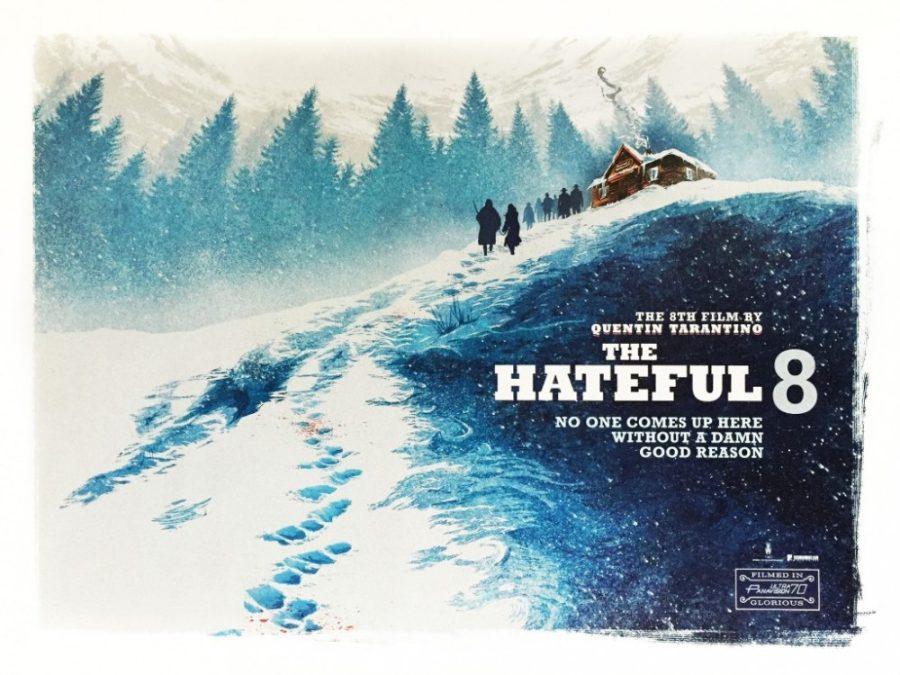Everyone remembers their first cup of black coffee. Its heavenly aroma disguised its unexpected bitterness and evoked scrunched-up facial expressions and the inevitable questioning of how anyone could actually enjoy such dreck. The answer: acquired taste. Much like a cup of strong coffee, Quentin Tarantino’s latest film The Hateful Eight requires an acquired taste — it’s full of bitter ingredients that will leave many viewers with an unpleasant taste in their mouths, but will please those with the necessary palate.
Of course, Tarantino knows this. It takes seven films that garner massive critical and fan acclaim before a director can make a movie like The Hateful Eight. Tarantino is one of the few men alive who can get the green light for an old-school western, one that clocks in at over three hours long, chock-full of mean and unpleasant plot and characters. That being said, all of this distastefulness equates to a bad film. Hateful Eight is an excellent movie and, like all Tarantino films, a love letter to cinema. However, I won’t be watching this one again for a long time.
The premise of the film is simple: in post-Civil War America, John Ruth (Kurt Russell) is a bounty hunter transporting the outlaw Daisy Domergue (Jennifer Jason Leigh) to her death when a blizzard forces Ruth to hole up in a cabin with devious characters. In other words, Bottle Episode: The Movie. The film’s premise implies that Ruth is the hero of the story when in fact this movie is the rare instance of a story devoid of heroes.
Every character Ruth encounters erodes any goodwill the viewer feels. Ruth achieves this via harsh words and actions and often a healthy dose of both. As the story progressed, I found myself keeping a mental power ranking of character likability. It turns out that within The Hateful Eight there is an inverse relationship between time spent with a character and their likability. The pervading vitriol was so persistent that I felt touched when one character offered a blanket to a freezing man that had just stumbled in from the blizzard. This act of kindness was like a drop of water in a desert of malice.
Take away all talk of nasty characters and slow-burning plot and The Hateful Eight is worth the price of admission for its sights and sounds. Shot in 70 mm, the snowy landscapes are breathtaking to behold. The gorgeous shots — and there are no other fitting descriptors besides gorgeous — combined with the fantastic original soundtrack composed by Ennio Morricone are the film’s strongest features.
On top of excellent music and visuals, the film features exceptional acting. It’s hard to pick one stand-out performance among the entire cast, but Walton Goggins, the racist but amiable Sheriff Chris Mannix, gives an award-worthy performance. Goggins’ portrayal of the excitable Mannix is almost enough to lull viewers into forgetting he is a racist asshole. Almost.
It’s apparent that racist assholes are a salient theme Tarantino is commenting on throughout The Hateful Eight. This film is directly opposed to his previous two films of historical revisionism, Inglorious Basterds and Django Unchained. Both films explored revenge fantasies: Inglourious Basterds righting the wrongs of Hitler and Django Unchained bringing justice to slavers. Rather than explore what we wish had happened, The Hateful Eight presents racism in all its ugliness.
Major Marquis Warren (Samuel L. Jackson), a veteran of the Civil War and the most prominent black character in the film, takes endless abuse for his race. Racial slurs are constantly flung at him with palpable spite. To combat the plight of existing as a black man in America, Warren keeps a personal letter from Abraham Lincoln in his coat pocket. According to Warren, the letter disarms him to white people and white people only feel safe when a black man is disarmed. No doubt this letter and Warren’s sentiment reflect Tarantino’s assessment on the racial climate of today’s America, especially when it is revealed that the letter is a lie Warren engineered to make his life easier.
Eventually, the slow-burn plot of “The Hateful Eight” comes to an explosive conclusion in typical Tarantino hyperviolence. Instead of coming across as cathartic, the ending feels like cold justice. The characters all deserve punishment, but the deliverance of justice does not result in warm and fuzzy feelings. Instead, I walked out of the theater with a taste in my mouth reminiscent of my first cup of coffee.
Rating: B+
Follow Alex Furrier on Twitter.









